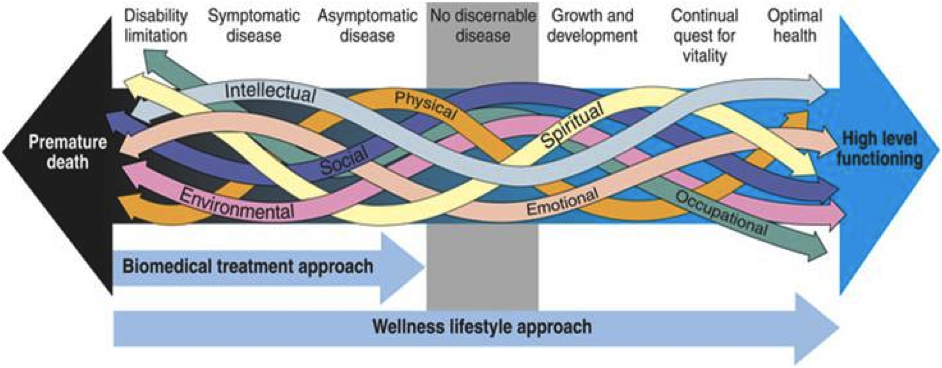Achieving well-being has been the concern of philosophers since Aristotle and before. Recently well-being has moved from the realm of philosophy to that of science, where it contributes to the quality of people’s experiences in their lives.
This has enabled a new understanding of the factors that both influence and constitute well-being. It touches on the dynamics of each individual as well as the various aspects within the individual to obtain optimal equilibrium, now we would call homeostasis.

Life’s events pose challenges to which we as individuals need to develop the required skills & resources to enable coping. These skills & coping mechanisms are directly responsible for the wellbeing of a person – where the balance point is referred to the actual point between the individuals resource pool and the challenges faced in life on a daily basis.
The triad of Psychological, Social & Physical elements are still relevant, and are constantly altering – while incorporating other aspects of daily existence.
The individual is a matrix of emotions, working with feelings and often harbouring ill / negative feelings & emotions such as hate, fear & resentment. These negative & powerful emotions can erode the core of the mental & spiritual being, to present itself in the form of recurrent physical ailments, pain or discomfort & disturbed mental and emotional balances – resulting in a disease pattern that eventually manifests physical or mentally in the form of an illness.
By getting the basics right – balanced life style – symptoms can be reduced & disappear to neutralise an illness / disease process to obtain the harmonious balance we strive towards.
Traditionally in the world of medicine, the short term treatment “prescribed” more than often treats the symptoms, and not the cause of the illness, and the essence of the person as a whole is lost.
A total overview & approach means we would require the use of various complementary modalities to address the person as a whole entity, comprised of the following:
Physical – Relating to the diet, exercise, relaxation & sleep patterns
Education – Where mental development is a focus & the skills levels & memory are nurtured and grown.
Psychological – Managing our emotions, building awareness of ourselves and others, while defining our perceptions and building on the self image – Emotional Intelligence
Ecological – Where we become 1 with nature, utilising it’s resources in a pure and environmentally friendly way. Understanding the aspects of geophysical stresses and reducing the negative impact on the planet.
Spiritual – Through transcendental prayer, or meditation we are able to develop our own personal spiritual journey and core.
Government / Legal – having the ability to respect the laws and the legal / governmental framework within which we live. We may not always agree but a level of respect is required to remain a law abiding citizen.
Relationships – to continue nurturing and growing the relationships we have within our family, friends and work colleagues – as this creates a more harmonious environment in which we live and participate daily.
Economic – where we are able to have an ability to support ourselves financially to be able to sustain a comfortable lifestyle – reducing the burden of financial strain & debt.
This would then be fair to assume that the quality of one’s life directly impacts on our wellbeing.
The WHO defines “Quality of Life” as: An individual’s perception of their position in life in the context of the culture & value systems in which they live in relation to their goals, expectations, standards & concerns. It is a broad ranging concept affected in a complex way by a person’s physical health, psychological state, personal beliefs, social relationships & their relationship to salient features of their environment.
The focus on positive functioning is more key than just the absence of illness” and the core dimension of psychological wellbeing – as self-acceptance, purpose in life, environmental mastery, positive relationships, personal growth & autonomy.
In conclusion – it is apparent that wellbeing is a continuum suggesting strong links between personality, life events, wellbeing and ill-being, where we gain insight and build the required skills & resources to cope with life’s challenges, without succumbing to negativity, relating to disease.

Hurrah! In the end I got a webpage from where I know how to truly get
helpful information regarding my study and knowledge. https://jurnal.unigal.ac.id/index.php/ekonologi/comment/view/15/0/15513
Like!! Really appreciate you sharing this blog post.Really thank you! Keep writing.